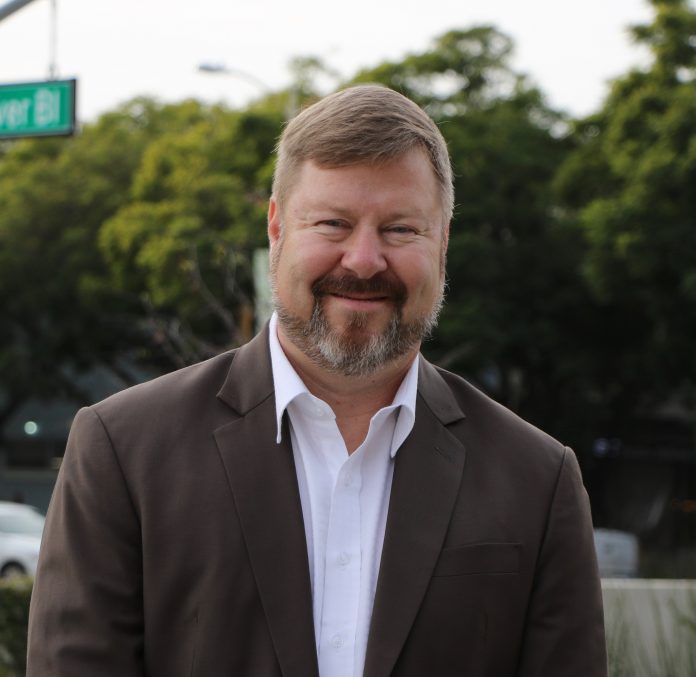Darrel Menthe, who is one of eight candidates for three Culver City council seats, isn’t new to the playing field of getting things done in politics, and he certainly isn’t new to Culver City either.
Menthe went to high school in Orange County before setting his sights high on Stanford Law. After finishing there, Menthe moved back to LA in 1995. Menthe and his wife, who got married in 2006, bought their first house in Culver City, and have lived and raised their two children here since.
As a member of the Finance Advisory Committee Menthe has a history of getting things done, notably being the driving force behind the widely successful parklet program that Culver City restaurants have been using to facilitate business outdoors during the COVID-19 pandemic.
Menthe says that his focus upon entering the council race revolved around two aspects: evaluating and improving the General Plan and increasing mobility in Culver City.
“The main thing I want to do is take a hard look at our General Plan and make sure that we are doing the right thing for the future of Culver City. That has got to do with land use, housing, everything gets wrapped up in the General Plan.”
Housing in particular has been a contentious topic with a permanent rent control ordinance set to take effect at the end of the month, but Menthe calls rent control “something you do because you have to, not because you want to.”
“It is a blunt instrument. But if we don’t have rent control here, the number of people that we will see displaced will be quite large. We have already seen it happen because market rents and the price of housing keeps going up and up five to 10 percent every year.”
One of the biggest concerns was the ordinance treating ‘Mom and Pop’ landlords who hadn’t been greedy with rents unfairly, but Menthe argues it is not about punishing landlords, but about keeping people in their homes in an ultimately uncontrollable situation.
“Even when landlords don’t raise rent in the short term, rents end up going really high in the long term,” Menthe said. “So, in a broken housing market that can’t produce enough housing, the only way to prevent displacement is to have local rent control, and because it’s more expensive on the Westside, state rules are just too flat for us.”
Rent control is just a short term fix, Menthe argues, and he says that he wants to focus more on the city’s housing market as a whole, and how connected and accessible it is. Menthe believes that focusing on this will help more than just housing in Culver City.
“In the long term, what I really want to see is a housing market that works,” Menthe began. “We don’t need hamburger pricing control, we don’t need bicycle pricing control, because the market takes care of those things for us. So, if we can commit to reimagining some of the neighborhoods that are like commercials strips as being vibrant, urban, walkable, bikable neighborhoods that are connected to transit, people can live there. We can provide the whole ‘missing middle’ of the housing market, which is gone right now, and we can begin to become a place where there are enough housing options.”
Menthe understands that there was a serious rift between some members of the public and city council during these rent control meetings, and acknowledges what he calls a “perception problem” regarding communication between the council and the public. However, he disagrees with the idea that the council has not been receptive to the public as a whole.
“There were a lot of decisions of previous councils that I can think of that went under the radar,” Menthe recalled. “So, in many ways, I think our council has been more responsive, with more public meetings and more public areas of discussion.”
“It is true that the people who don’t like what our council is doing feel like they haven’t been listened to, but part of that is because they didn’t get what they wanted. But there also probably is something there.”
He already has a particular idea to begin improving communication: getting meeting agendas out earlier.
“Even 48 hours earlier shouldn’t be a burden on city staff, and would give people an opportunity to learn, interact, and socialize,” Menthe claimed. “Expressing yourself at council meetings is one way to be heard, but another way to be heard is all the informal conversations that take place between the public and members of the council, but it is harder to have those conversations if there is no time in which to have them.”
Menthe hopes that these conversations are the start of a less contentious relationship between council and the public.
“I certainly know plenty of people that can get to the point where they realize ‘ok, what happened was not what I wanted, but at least I was respected and heard,’ and I think that is a goal we should all strive for,” Menthe said.
Menthe has been criticized by the Culver City Police Officers’ Association as someone who would not take a particular stand on the ‘Defund the Police’ movement. Menthe explained that he believed the debate itself is one that only leads to dead ends, and the conversation’s narrative should be changed.
“Usually when I am asked [about the police], it’s one of those false choices of defend vs defund that don’t lead us anywhere,” Menthe began. “The real question is what changes should we make to our law enforcement and public safety programs to make good on the promise that ‘Black Lives Matter.’”
“‘Black Lives Matter’ is not just a slogan, it’s a commitment to take the issue seriously. I support the public safety review process; I am part of that as vice chair of the Finance Committee. It’s going to take some time, and it’s going to take some careful work.”
Menthe was the head of the Downtown Business Association for four years, and says that experience made him truly privy to the importance of public safety and law enforcement. However, he sees the other side as well, and realizes that everyone’s concerns need to be considered.
“I think that we are looking at people in the streets saying, ‘Black Lives Matter’ is because we want to see some change, and I think we need to take that seriously.”
Menthe also mentioned that he expected the most likely outcomes from the public safety review to be more independent manpower focused on mental health and social welfare services, which is where much of the discussion at that meeting held Oct. 12-13 was based in. Menthe believes that providing the police with help in situations they aren’t extensively trained for should be considered a viable option
“Police are well trained for some things, but they are not trained to deal with the mentally ill,” Menthe explained. “Treating the police as an all-purpose social welfare agency is one of the things that can cause the kind of misunderstandings that lead to people getting hurt.”
Menthe understands the tense public climate surrounding the police, but says it’s “disappointing” that people feel his views are an attack on the police, saying he is proud to work the department to make them better for everyone.
Menthe says that at the end of the day, he hopes that people remember him as
“I want people to look around and think two things,” Menthe started.
“I want them to think that it is wonderful that our sense of community has grown over time, and I want them to be delighted that changes that have been made to make this a livable, walkable, bikable city where their kids may yet be able to afford to live some day.













